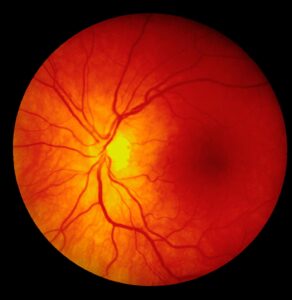
Adverum Biotechnologies acknowledged last night that a patient lost sight in the eye that was treated in a Phase II trial with the company’s lead gene therapy candidate ADVM-022 (AAV.7m8-aflibercept) for diabetic macular edema (DME)—leading to a 60% plunge in the company’s stock price in early trading.
The company announced that the patient developed hypotony with panuveitis and loss of vision in the treated eye 30 weeks after the patient was randomized to receive a single intravitreal injection of the high dose (6 x 10^11 vg/eye) of ADVM-022.
Adverum said it responded to the Suspected Unexpected Serious Adverse Reaction (SUSAR) “in the interests of patient safety” by immediately unmasking the Phase II INFINITY trial (NCT04418427) to better understand what happened, “and to help identify and manage any similar potential risk to other patients in this study.”
The INFINITY trial has been evaluating two doses of a single intravitreal injection of ADVM-022 gene therapy—either a high dose 6 x 10^11 vg/eye or low dose 2 x 10^11 vg/eye. Participants in the double-masked INFINITY trial were randomized to one of three arms for their study eye treatment: Arm 1 received high dose (6 x 10^11 vg/eye) of ADVM-022, Arm 2 received low dose (2 x 10^11 vg/eye) of ADVM-022, and Arm 3 received aflibercept at a dose of 2 mg.
Additional objectives include assessments of treatment burden, visual acuity, retinal anatomy, and safety outcomes.
The patient who lost sight was dosed with ADVM-022 in dosed in late September or early October, while the 36-participant INFINITY trial completed dosing in December.
Adverum also said it was reviewing data from INFINITY, and plans to report its findings “as the analysis progresses.”
“The safety of every patient who is participating in our clinical studies with our gene therapy is the utmost priority for us at Adverum,” CEO Laurent Fischer, MD, said in a statement. “We are fully committed to thoroughly assessing this case and ongoing monitoring of this patient and all patients treated with ADVM-022 with our investigators, data monitoring committee (DMC), scientific advisory board, and healthcare authorities.”
Underlying comorbidities unknown
Investors responded to the SUSAR with a stock selloff that sent shares of Adverum plummeting 60% from yesterday’s close of $10.16 a share to $4.04 as of 11:20 a.m.
“It is unclear at this time if the patient had underlying comorbidities or risk factors (beyond those implicit in any DME study population) that predispose to hypotony or panuveitis,” Mani Foroohar, MD, managing director, Genetic Medicines and a senior research analyst with SVB Leerink, wrote last night in a research note.
Foroohar lowered SVB’s one-year price target from $21 a share to $11 a share based on the news.
ADVM-022 uses a propriety vector capsid, AAV.7m8, carrying an aflibercept coding sequence under the control of a proprietary expression cassette. ADVM-022 is designed to be administered as a single, in-office intravitreal injection, and intended to deliver long-term efficacy and reduce the burden of frequent anti-VEGF injections, optimize patient compliance, and improve vision of patients.
Adverum is assessing ADVM-022 for DME as well as wet age macular degeneration (AMD). In wet AMD, Adverum has been planning to launch two Phase III studies, each of 450 patents (PIVOTAL-a and PIVOTAL-b) in the fourth quarter that compare the gene therapy candidate to Q8W aflibercept in newly-diagnosed patients. Both trials are intended to support a BLA submission that the company anticipates filing in 2024.
“Out of conservatism, we also assume initiation of wet-AMD pivotal trials could face delays and have pushed back commercialization of ADVM-022 in wet AMD 1 year into 2026,” Foroohar wrote.
In announcing both Phase III trials on March 1, Adverum said it was also preparing for commercialization of ADVM-022 by expanding its chemistry, manufacturing, and controls (CMC) capabilities and investing in an in-house GMP manufacturing facility.
ADVM-022 is also under study in wet AMD in the 30-participant, Phase I OPTIC trial (NCT03748784).
“The uncertainty around this [SUSAR] event may cause the Phase [III] pivotal trials of ADVM-022 to see meaningful delays in study initiation and enrollment as the company interacts with FDA, data monitoring committee, and trial investigators to better understand the SUSAR and potential implications for the risk/benefit profile of ADVM-022 in wet AMD,” Foroohar predicted. “We recognize the SUSAR in INFINITY could potentially lead to more regulatory scrutiny for ADVM-022 in wet AMD and lower our probability of success to 40% from 50%.”

